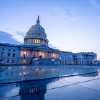U.S. Supreme Court Strikes Down Maine Law Prohibiting Tuition Assistance to Religious Private Schools

Number 35
In Carson v. Makin (2022) ___U.S.___ [141 S.Ct. 1987], the United States Supreme Court, by a 6-3 decision, ruled that Maine’s tuition assistance program, which prohibits funding to nonsectarian schools, violated the Free Exercise Clause of the First Amendment.
Background
In 1981, Maine enacted a program of tuition assistance (Program) for parents who live in school districts that do not operate a secondary school of their own. Under the Program, parents could designate the secondary school they would like their child to attend—public or private—and the school district transmitted payments to that school to help cover the tuition costs. Most private schools were eligible to receive the payments, so long as they were “nonsectarian.” The Program did not allow tuition assistance for sectarian schools, regardless of the school’s particular characteristics, policies, and practices. Two families sued the state after they were denied the Program’s benefits to attend an otherwise eligible, religious private school.
This case illustrates the tension between the Establishment Clause, which prohibits the government from establishing an official religion or favoring one religion over another, and the Free Exercise Clause, which prohibits coercion or penalties based on the exercise of religion. Subsequent to the enactment of the Program, in Zelman v. Simmons-Harris (2002) 536 U.S. 639, the Supreme Court held that a benefit program under which private citizens “direct government aid to religious schools wholly as a result of their own genuine and independent private choice” does not offend the Establishment Clause. The Zelman case, however, did not resolve the Free Exercise issue.
In Carson, the Court relied on its recent decisions in Espinoza v. Montana Department of Revenue (2020) ___U.S.___ [140 S.Ct. 2246] and Trinity Lutheran Church of Columbia, Inc. v. Comer (2017) ___U.S.___ [137 S.Ct. 2012] in holding that the “nonsectarian” condition of the Program violated the Free Exercise Clause of the First Amendment. Espinoza held that a provision of the Montana Constitution barring government aid to any school “controlled in whole or in part by any church, sect, or denomination” violated the Free Exercise Clause by prohibiting families from using otherwise available scholarship funds at the religious schools of their choosing. The Court noted that a state need not subsidize private education, but once a state decides to do so, it cannot disqualify some private schools solely because they are religious.
Along the same lines, in Trinity Lutheran, the Supreme Court struck down as unconstitutional a state policy that excluded churches from participating in a government benefit program solely based on their religious status. In Carson, the Court reasoned that the distinction in this case, of use-based discrimination (i.e., arguing that funds would be used for religious inculcation), is not any less offensive to the Free Exercise Clause.
In reaching its conclusion in Carson, the Court disagreed with Maine’s reliance on Locke v. Davey (2004) 540 U.S. 712, a prior Supreme Court opinion in which the Court held that the Free Exercise Clause was not violated when the State of Washington denied a scholarship to a recipient planning to pursue a theology degree. The Court noted that Locke did not provide states authority to generally exclude persons from the enjoyment of public benefits based on their anticipated religious use of the benefits.
Takeaways
The Supreme Court’s opinion serves as a reminder that if a state elects to provide tuition aid for private education, it may not restrict the recipient’s school choice based solely on the sectarian nature of the school.
For more information about the Carson case, the Free Exercise Clause, or other constitutional questions common to governmental entities, please contact the authors of this Client News Brief or an attorney at one of our eight offices located statewide. You can also subscribe to our podcast, follow us on Facebook, Twitter and LinkedIn or download our mobile app.
Disclaimer: As the information contained herein is necessarily general, its application to a particular set of facts and circumstances may vary. For this reason, this News Brief does not constitute legal advice. We recommend that you consult with your counsel prior to acting on the information contained herein.






